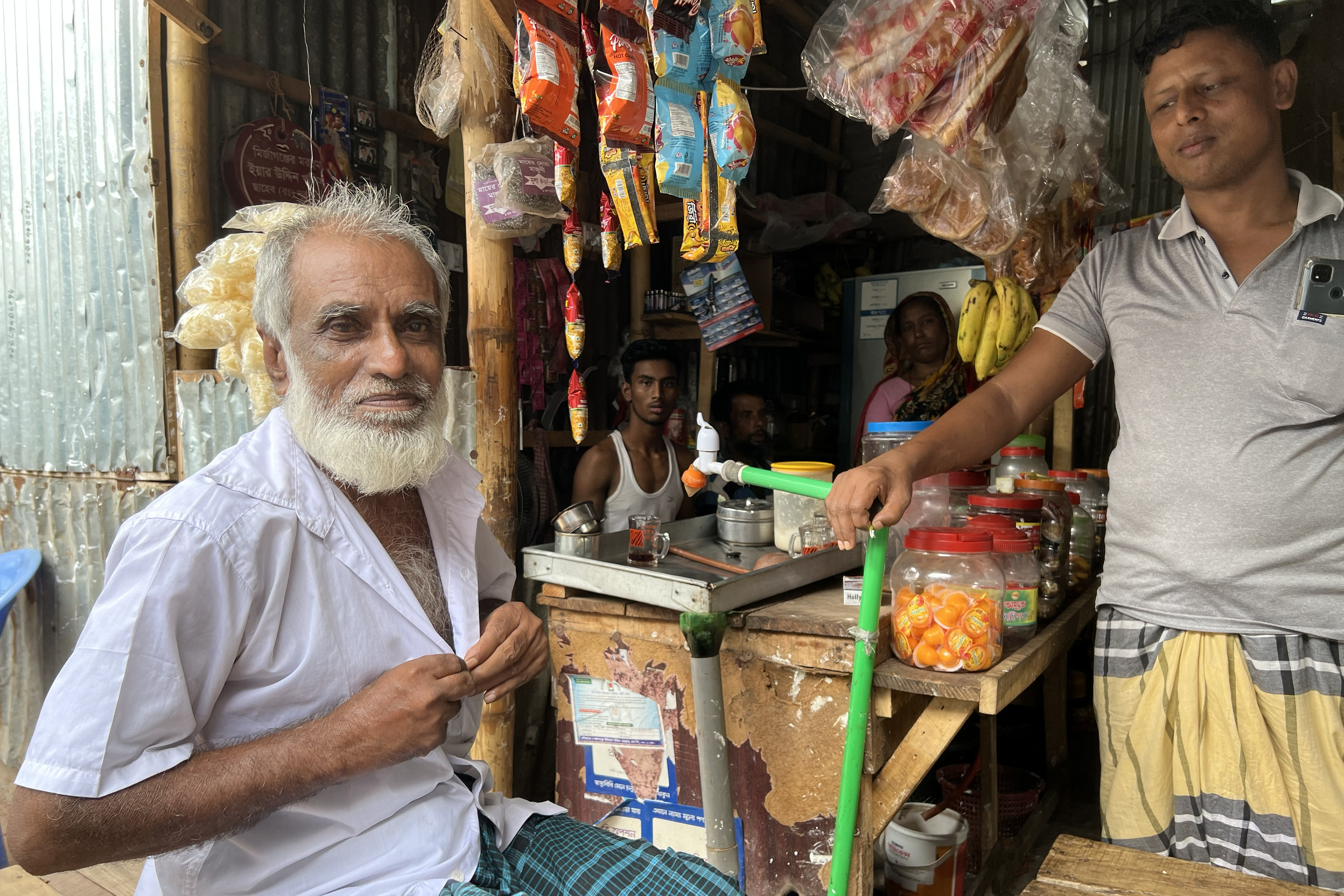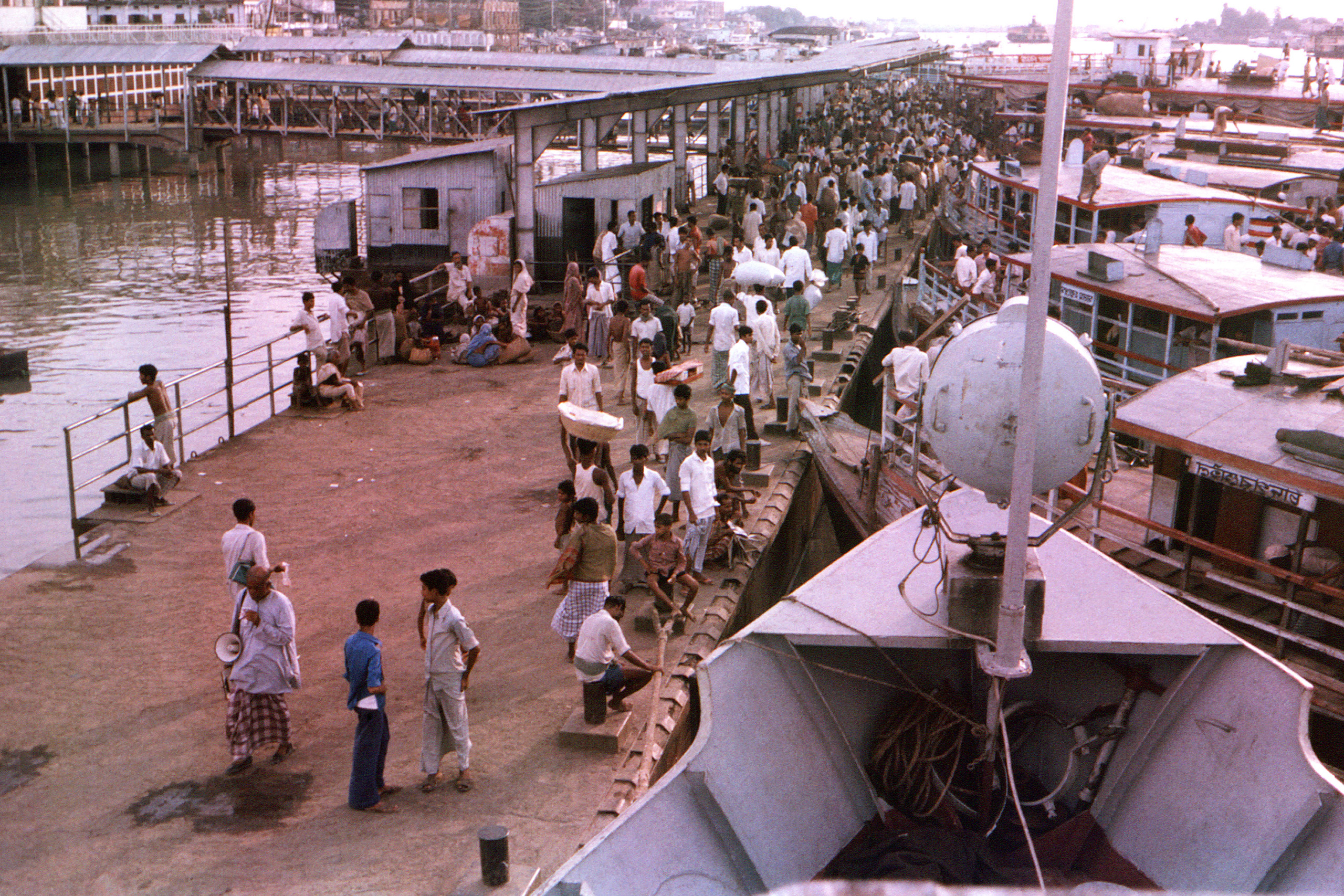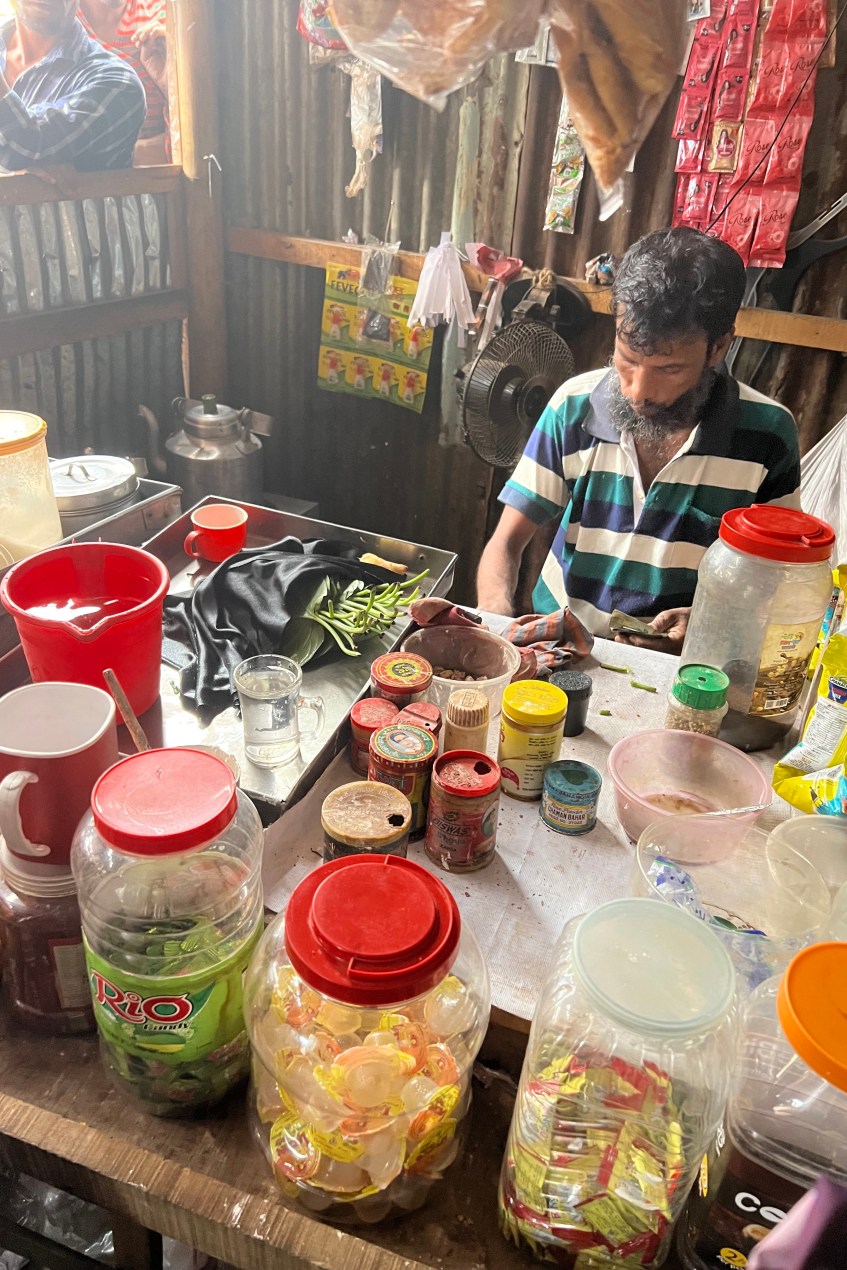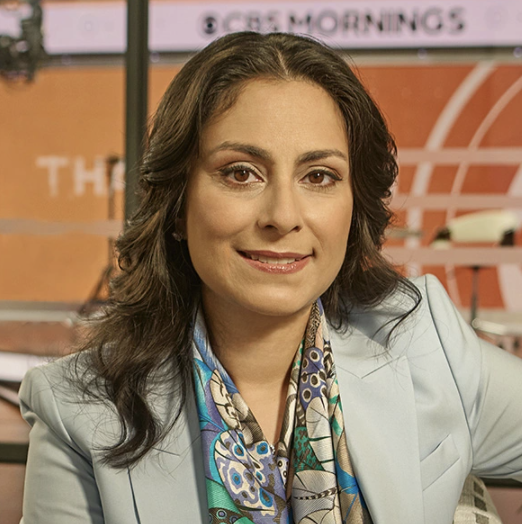Podcast Transcript
Epidemic: “Eradicating Smallpox”
Season 2, Episode 7: What Good Is a Vaccine When There Is No Rice?
Air date: Oct. 24, 2023
Editor’s note: If you are able, we encourage you to listen to the audio of “Epidemic,” which includes emotion and emphasis not found in the transcript. This transcript, generated using transcription software, has been edited for style and clarity. Please use the transcript as a tool but check the corresponding audio before quoting the podcast.
[Ambient sounds from a ferry play softly.]
Céline Gounder: I’m on a boat in southern Bangladesh, headed toward Bhola, the country’s largest island.
We’re traveling by ferry on calm waters. But my head spins — and my stomach roils just a bit — as I imagine how these same waters nearly destroyed Bhola Island.
[Tense instrumental music begins playing.]
It was 1970.
In November, under an almost-full moon and unusually high tides.
The island was hit by one of the most destructive tropical storms in modern history: the Bhola cyclone.
[Shohrab speaking in Bengali fades under English translation.]
Shohrab: There were floods. Back then there weren’t any embankments to stop the water from rising.
Céline Gounder: Counterclockwise winds, torrential rains, and treacherous waves swept entire villages into the sea. People held onto whatever they could to keep their heads above water.
[Shohrab speaking in Bengali fades under English translation.]
Shohrab: I remember at that time the water level rose so high that people ended up on top of trees. The water had so much force. Many people died.
Céline Gounder: The Bhola cyclone killed some 300,000 people. And for those who survived, there wasn’t much left to return to. Hundreds of thousands of people lost their homes, their farms, and their access to food.
The man whose voice you’ve been hearing was one of the survivors.
[Shohrab speaking in Bengali fades under English translation.]
Shohrab: My name is Shohrab. I am 70 years old.
Céline Gounder: Shohrab was a teenager when the cyclone hit. And in the days and weeks after the storm, he and his family joined a mass migration of people who fled southern Bangladesh.
They traveled about a hundred miles north from Bhola Island to the streets of Dhaka, the busy capital of Bangladesh.
There, they settled in a makeshift community, a kind of unsanctioned encampment dubbed the Bhola basti.
In Bengali that word,“basti,” means settlement — or “slum,” in some translations.
The residents forged a community, but soon, the poor people there — and what they built — would be seen as a threat to the effort to keep smallpox in check.
Not just in South Asia — but around the world.
I’m Dr. Céline Gounder. This is “Epidemic.”
[“Epidemic” theme music plays.]
[Ambient sounds from the Bhola basti, including voices of people speaking Bengali, play softly.]
Céline Gounder: More than 50 years after the cyclone, Shohrab lives in the same area in Dhaka.
I interviewed him at a tea stall near his home. It’s the kind of place where men gather to gossip and share stories over hot drinks.
Inside there’s a colorful display of snacks and sweets hanging from the ceiling. Just outside we sat on well-worn wooden benches.
And as we sip our tea, he tells me about life in the encampment in the 1970s …
[Sparse music plays softly.]
[Shohrab speaking in Bengali fades under English translation.]
Shohrab: I used to rent a place there. Five or six of us used to live in one room. Sometimes it was eight people in a room.
Céline Gounder: To cover his portion of the rent he worked as a day laborer, doing odd jobs here and there. Over time the basti became home.
But Shohrab’s new home was likely seen as an eyesore by outsiders — and by the Bangladeshi government.
Such settlements often lack running water, or electricity, or access to proper sanitation. Those conditions spotlight suffering — and for local leaders that spotlight can be uncomfortable.
But, public health experts had a different concern: that the settlement of Bhola migrants in Dhaka would become a deadly stronghold for smallopox. Cramped and unsanitary living conditions put the residents at high risk.
I ask Shohrab if he remembers seeing or hearing about people with smallpox when he first arrived.
[Shohrab speaking in Bengali fades under English translation.]
Shohrab: I wasn’t thinking about that. I was more focused on issues like where would I work, what would I eat, etc.
Céline Gounder: As he tried to rebuild his life, other things — like food and shelter — were more urgent.
[Music fades to silence.]
Widening beyond that one migrant encampment in Dhaka, researchers say the picture was similar in cities and villages all across the country.
Bangladesh was hit with a series of crises. Environmental historian Iftekhar Iqbal says each brought human suffering — and that each was a blow to the smallpox eradication effort.
Iftekhar Iqbal: Seventies was really a time when, the coming of the smallpox couldn’t come at a, at a more unfortunate time.
Céline Gounder: In 1970 the Bhola cyclone hit. In 1971, just four months later, the country fought a bloody liberation war. Then, in 1974, heavy rain and flooding triggered a famine. And in 1975 there was a military coup.
Iftekhar Iqbal: The 1970s was the deadliest decade in the history of Bangladesh.
Céline Gounder: This period is when the country became Bangladesh — winning its independence from Pakistan in the liberation war. But residents of the young nation faced cascading upheaval and turmoil. And too much death.
[Instrumental music plays softly.]
On the global stage stopping smallpox was important, but many in Bangladesh were just trying to make it to the next day.
Daniel Tarantola: No. 1 priority is food and food and food. And the second priority is food and food and food.
This was an area where survival was always in question.
Céline Gounder: That’s Daniel Tarantola.
He’s from France and arrived in the region with the mission of helping to eradicate smallpox, but he says the people in front of him needed help with many other things.
Besides hunger, some of the villages he visited were dealing with two epidemics: smallpox and cholera.
Daniel Tarantola: And we were not equipped to do anything but smallpox containment and smallpox eradication. By design or by necessity, we didn’t have the means to do anything much more than that.
Céline Gounder: Over the course of this season we’ve talked about big, complicated issues — like stigma and bias, distrust, or First World arrogance — that threatened to derail the smallpox eradication campaign. We’ve documented the public health workers who found a way around those roadblocks.
But sometimes the need is so big, so entrenched, that your inability to meet it can be demoralizing. I sometimes felt that during my own fieldwork: battling HIV and tuberculosis in Brazil and southern Africa, and during an Ebola outbreak in Guinea, West Africa.
Daniel Tarantola says in South Asia the best he could do was focus on the task at hand.
Daniel Tarantola: Meaning that you had to set up a program to eradicate smallpox or at least eliminate it from Bangladesh and at the same time not get … if I can use the word distracted, um, by other issues that prevailed in Bangladesh.
[Music fades out.]
Céline Gounder: Those were tough emotional realities for health workers and the people they wanted to care for.
But …
Daniel Tarantola: The level of resilience of this population is absolutely incredible given the number of challenges that they have had to survive.
Céline Gounder: One of the main ways people survived the upheaval in Bangladesh was by picking up and moving away from the things trying to kill them.
Remember how Shohrab fled to Dhaka after the cyclone?
Well, mass migration is a survival strategy — but one that can worsen disease.
When the cyclone refugees from Bhola landed in that under-resourced basti in Dhaka, all smallpox needed was an opportunity to spread.
[Solemn music begins playing.]
That opportunity came in 1975 when the Bangladeshi government decided to bulldoze the Bhola basti.
Daniel Tarantola says it was a bad idea.
Daniel Tarantola: We knew there was smallpox transmission in this particular area and therefore they should wait until the outbreak subsides before dismantling the shanties.
Céline Gounder: Government officials did not wait for the outbreak to subside. They bulldozed the basti anyway.
Daniel Tarantola: That resulted in a wide spread of smallpox.
Céline Gounder: Here’s environmental historian Iftekhar Iqbal again.
Iftekhar Iqbal: This eviction is considered one of the policy errors that led to the second wave of postwar smallpox.
Céline Gounder: In the wake of that eviction in 1975, thousands of people scattered. Some surely returned back home to Bhola.
[Music fades out.]
Céline Gounder: Public health’s failure — the government’s failure — to meet the basic need for safety, for food and housing, delayed the goal to stop the virus.
Shahidul Haq Khan, the Bangladeshi public health worker and granddad we met in Episode 4, says he learned that lesson over and over as he urged people to accept the smallpox vaccination.
Their frustration with him — and by extension public health — was clear.
[Shahidul speaking in Bengali fades under English translation.]
Shahidul Haq Khan: There was no rice in people’s stomachs, so what is a vaccine going to do? “You couldn’t bring rice? Why did you bring all this stuff?” That was the type of situation we had to deal with.
[Atmospheric music begins playing.]
Céline Gounder: What good is a vaccine when there is no rice?
Next up, I speak with Sam Tsemberis, founder of Pathways Housing First Institute. It’s an organization that advocates for meeting people’s basic needs first, so they’ll have the best shot at health.
But in the beginning, he found out convincing institutions was easier said than done:
Sam Tsemberis: I try to explain this rationale that I’m telling you, like people need housing first and then services. The hospital is like, “No, no, we’re in the hospital business. We’re not in the housing business.”
Céline Gounder: That’s after the break.
[Music fades to silence.]
Céline Gounder: One of my mentors was Dr. Paul Farmer, the legendary doctor and anthropologist whose work in Haiti was documented by Tracy Kidder in the book “Mountains Beyond Mountains.” Paul always pushed us to look beyond the symptoms to root causes. It’s a lesson we keep having to learn in public health again and again.
Sam Tsemberis is one of the first to apply it to homelessness. He’s the CEO of a nonprofit called the Pathways Housing First Institute. The organization promotes a model of addressing homelessness that begins with putting people into housing.
That idea seems pretty obvious. But back when Sam first started working on homelessness — in New York City in the 1980s — the prevailing model was more like a staircase. People had to work their way up to show they were ready for, or even worthy of, housing.
Sam Tsemberis: If you showed up applying for housing, you had to acknowledge you had a mental illness, you had to demonstrate that you were taking medication, and that you understood why you were taking medication. And you also had to have — if you had any history of alcohol or substance use, you also had to demonstrate a period of sobriety.
It was a very tough regimen to get into housing.
Céline Gounder: Sam said he quickly realized that wasn’t working, even though it was the only approach at the time.
Sam Tsemberis: I was working very hard to help people navigate that. I was doing street outreach. So, “Come come to the shelter, come to the hospital, come to a treatment program, a drop-in center,” hoping that they would engage and successfully make it up the stairs and get housing eventually.
And what began to emerge was that even if people were willing to take the first step — let’s say go to detox or go to the hospital — far too many people ended up returning to the street, which was, which was a signal that, you know, something was wrong with this system. It’s like, why are people falling back?
And the stories on the street were compelling. You know, people would say, “No, I don’t need to go to detox. What I need is a safe place to stay.”
Or, “Yeah, I’ve been diagnosed with schizophrenia, but … you know, and I still hear voices, but I don’t pay attention to them. Right now, I’m just cold, I’m tired, I’m hungry, I need a place to be safe. I need to go inside. That’s what I need first.”
And the repeated pleas for safety, security, a place to call home, from people that had tried and failed and tried and failed that staircase system is what compelled me to, you know, try something different, because what we were doing wasn’t working. And that’s when we started this housing-first approach.
Céline Gounder: Can you explain: What is that, and what’s its impact?
Sam Tsemberis: Housing-first is the answer to a question that we ask people. “OK, what is it that you want?” And people would inevitably say, “I want a place to live, isn’t it obvious?”
So our job as providers, then, was to figure out a way to have a program that we can get money for rent, and money for case management services, and give people who had previously no opportunity to get into housing on their own terms, and also offer the kind of clinical or social or emotional support that’s needed after people get housed.
Céline Gounder: So how did you pilot or how did you jump-start this effort? What did that look like?
Sam Tsemberis: So we ended up having to start our own nonprofit agency, apply for a grant, and we, with fingers crossed, we started to take people that were actively using and in some cases actively symptomatic and put them into apartments of their own and visit them a lot, not knowing how it would turn out.
What we found, much to our shock and surprise, very pleasant surprise, is that 85% of the people we housed, even in that first year, remained housed. And we thought, well, you know, we’re onto something here.
Céline Gounder: So instead of insisting that people be treated for addiction and mental health issues before they got into housing, you gave them housing first. And that was really sort of the measure of success.
Sam Tsemberis: Yes.
Céline Gounder: How successful was the program in treating addiction and mental health?
Sam Tsemberis: The addiction and mental health treatment outcomes were modestly better for the housing-first group that didn’t require to be in treatment. But you know, their treatment was no worse and a little better than the group that required treatment and sobriety.
And there, a measure called the overall quality of life, you know, like, how happy are you with living in the community, with your contacts with relatives, and so on. The group that went into housing first had a significantly higher quality of life than the treatment-first group.
Céline Gounder: So I know there are people out there who will say, Well, you didn’t solve their addiction issue or their mental health issue; how is that a success? How would you respond to that criticism?
Sam Tsemberis: This was never advertised as a program that cures addiction or cures mental illness. Recovery, in some ways, is not abstinence. Recovery, at least in the mental health business, is having a life in spite of your diagnosis.
The main thing is you’re no longer homeless. You know, you don’t have to be on the street until you’ve cured your illness. Because if that was the case, people would likely die on the street before they cured their illness because we don’t have cures for some of these illnesses.
Céline Gounder: So, Sam, Dr. Paul Farmer was a mentor of mine, actually, over the course of my training. And in Tracy Kidder’s biography of Paul, there’s a quote of one of Paul’s colleagues, Haitian colleagues, who says that, “Giving people medicine for tuberculosis and not giving them food is like washing your hands and drying them in the dirt.”
Sam Tsemberis: That is so on target for what all of these issues are about. I think of homelessness, actually, as a poorly named term for all of the systemic failures that people have faced in order to end up homeless.
We need to get, you know, take care of the emergency, put everyone in housing, but that’s sort of the beginning of the job. Then the real work starts to address the root causes that contribute and continue to increase the problem as opposed to just dealing with the symptom all the time.
[“Epidemic” theme music begins playing.]
Céline Gounder: Next time, on the series finale of “Epidemic: Eradicating Smallpox” …
Rahima Banu.
Redwan Ahmed: Rahima Banu.
Daniel Tarantola: Rahima Banu.
Iftekhar Iqbal: Rahima Banu.
Larry Brilliant: The last case …
Steve Jones: The last case …
Alan Schnur: The last case of variola major smallpox. I think this time we’ve got it.
Céline Gounder: “Eradicating Smallpox,” our latest season of “Epidemic,” is a co-production of KFF Health News and Just Human Productions.
Additional support provided by the Sloan Foundation.
This episode was produced by Taylor Cook, Zach Dyer, Bram Sable-Smith, and me.
Saidu Tejan-Thomas Jr. was scriptwriter for the episode.
Redwan Ahmed was our translator and local reporting partner in Bangladesh.
Our managing editor is Taunya English.
Oona Tempest is our graphics and photo editor.
The show was engineered by Justin Gerrish.
We had extra editing help from Simone Popperl.
Voice acting by Susheel C. and Pinaki Kar.
Music in this episode is from the Blue Dot Sessions and Soundstripe.
We’re powered and distributed by Simplecast.
If you enjoyed the show, please tell a friend. And leave us a review on Apple Podcasts. It helps more people find the show.
Follow KFF Health News on X (formerly known as Twitter), Instagram, and TikTok.
And find me on X @celinegounder. On our socials, there’s more about the ideas we’re exploring on our podcasts.
And subscribe to our newsletters at kffhealthnews.org so you’ll never miss what’s new and important in American health care, health policy, and public health news.
I’m Dr. Céline Gounder. Thanks for listening to “Epidemic.”
[“Epidemic” theme fades out.]










